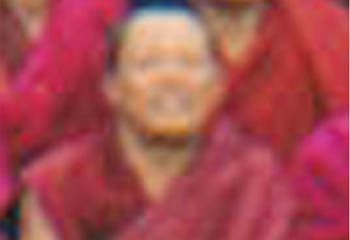 Dharamshala: - The Chinese state controlled media 'Xinhua' claimed that the Ngaba Prefecture Intermediate people's court has found 46-year-old monk Lobsang Tsondue guilty of hiding Phuntsok after his attempt at self-immolation on 16 March, thereby preventing Phuntsok from receiving emergency medical treatment for 11 hours.
Dharamshala: - The Chinese state controlled media 'Xinhua' claimed that the Ngaba Prefecture Intermediate people's court has found 46-year-old monk Lobsang Tsondue guilty of hiding Phuntsok after his attempt at self-immolation on 16 March, thereby preventing Phuntsok from receiving emergency medical treatment for 11 hours.
Tsondue is late Phuntsok's uncle and was also his tutor at the Kirti monastery in Tibet. Tsondue is from the town of Meruma in Ngaba county, in the Amdo region of Eastern Tibet, according to Ven. Lobsang Yeshi and Kanyak Tsering from the Kirti monastery in Dharamshala, India..
After dousing the flames, Chinese security personnel began to beat the charred body of Phuntsok severely. Local Tibetans believe that Phuntsok died as a result of the beatings, and not from lack of medical treatment. Phuntsok died the next morning after treatments failed at a local hospital. 'Tsondue pled guilty to the murder charge and said that he felt very regretful over the hiding and prevention of emergency treatment and asked for leniency,' according to the Chinese news report. Tsondue said to the court that he would not appeal against the verdict.
Tsondue and Phuntsok's older brother Dhargye were first arrested on 20 March, and released after five days of detention. However, Tsondue and Dhargye were arrested again on April 12, and their whereabouts had remained unclear until their appearance Tuesday for the one-day trial.
As earlier reported by Xinhua, a second trial will be held Wednesday, 31st August for two more Kirti monks, both named Lobsang Tenzin from the Lobta family and the Pema family, who are accused of "plotting, instigating, and assisting" in the self-immolation of Phuntsok. The families of both monks on 28 August received issued notice from the Chinese Intermediate People's Court that they had been summoned to Barkham, where the two monks await trial.
The 16 March death of Phuntsok was seen as a protest against China's heavy-handed controls over Tibet and provoked both subsequent protests and a standoff between security forces and monks. The Kirti monastery in Ngaba county has been under heavy security lockdown ever since. Some 300 monks from the monastery have been arrested, and were taken away into custody by Chinese security forces to an unknown location during the night of 21 April. There is no news of the detained monks, and the area continues to remain off-limits to foreign journalists.
The circumstances surrounding the death of Phuntsok death remain murky. In June, China rejected pressure from a U.N. human rights panel to provide information about the 300 monks from Kirti monastery, and China has since denied U.N. accusations that the monks were forcefully "disappeared," insisting that relevant local authorities are currently "conducting legal education for the Kirti monastery monks in order to maintain religious order there."
The Chinese Foreign Ministry has said only that monks were undergoing "legal education"-a reference to compulsory political lectures on the basics of the Chinese Constitution, criminal law, and regulations on religious affairs.
Earlier this month, another young Tibetan monk burnt himself to death in eastern Tibet in apparent protest against Beijing's rule in the region. The monk was identified as 29-year-old Tsewang Norbu from the Nyitso Monastery in the town of Tawu county.
Although China's state-run media said it was unclear why Norbu committed the act, human rights groups have said that the monk was protesting against the harsh treatment of Tibetans by the Chinese administration since the 2008 mass demonstrations in all parts of Tibet, as well as the ongoing suppression of Tibetan culture.


![Tibet has a rich history as a sovereign nation until the 1950s when it was invaded by China. [Photo: File]](/images/stories/Pics-2024/March/Tibet-Nation-1940s.jpg#joomlaImage://local-images/stories/Pics-2024/March/Tibet-Nation-1940s.jpg?width=1489&height=878)















